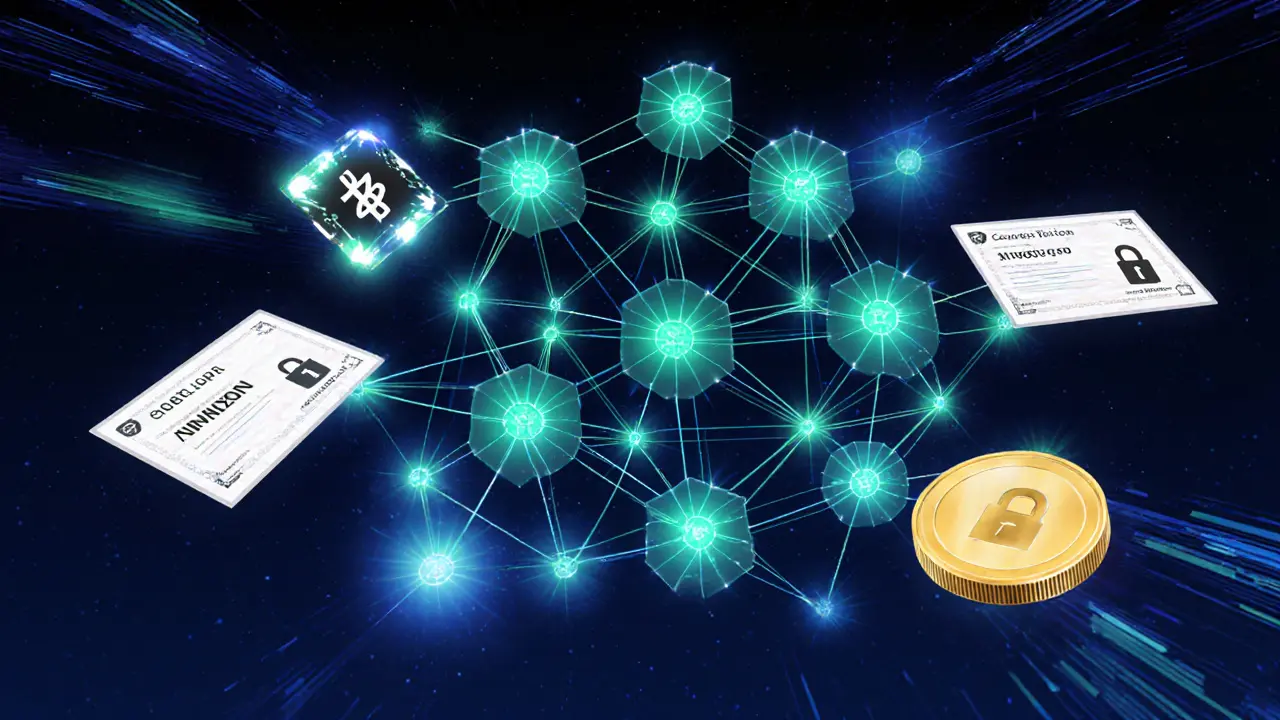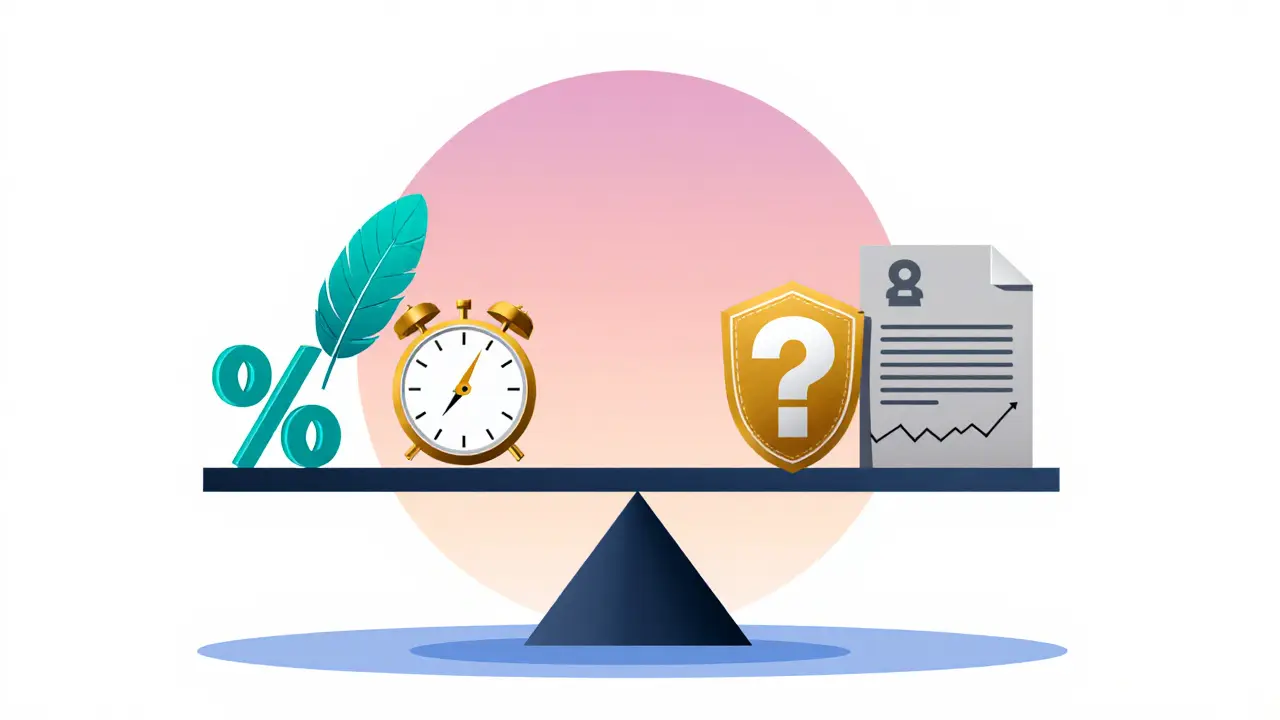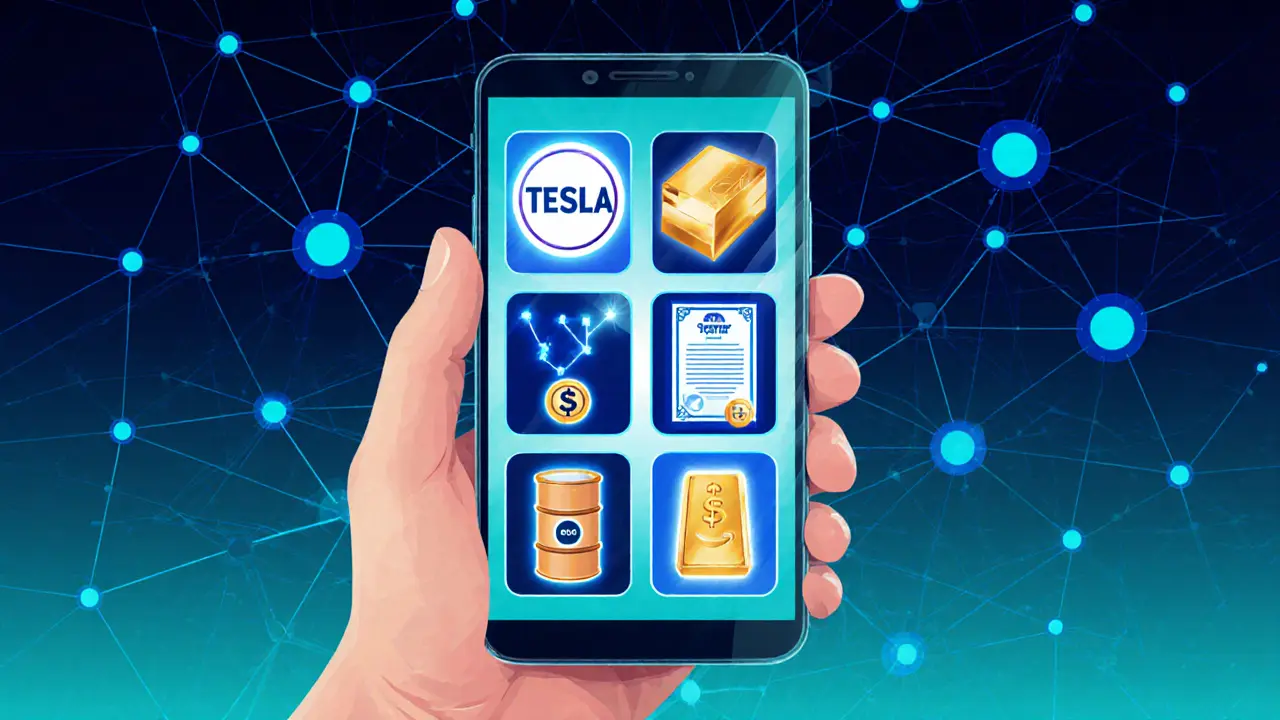DSTOQ Tokenized Assets Explorer
What Are Tokenized Assets?
Tokenized assets represent ownership of real-world securities like stocks, bonds, or commodities on a blockchain. Each token mirrors the underlying asset's value and rights.
Why Use DSTOQ?
DSTOQ enables access to global markets without traditional brokers. It leverages Stellar's fast and low-cost transactions for seamless trading of tokenized assets.
Available Tokenized Assets
Tesla (TSLA)
Ratio: 1:1
Type: Equity
Settlement: Fast (seconds)
Amazon (AMZN)
Ratio: 1:1
Type: Equity
Settlement: Fast (seconds)
U.S. Treasury Bonds
Ratio: 1:1
Type: Government Bond
Settlement: Fast (seconds)
S&P 500 Index
Ratio: 1:1
Type: ETF
Settlement: Fast (seconds)
Gold Commodity
Ratio: 1:1
Type: Precious Metal
Settlement: Fast (seconds)
Oil Futures
Ratio: 1:1
Type: Commodity
Settlement: Fast (seconds)
Fee Information
DSTOQ claims trading fees around 0.1% per transaction, plus minimal Stellar network fees (fractions of a cent). These are significantly lower than traditional brokers and many crypto exchanges.
Note: Fee schedules are not publicly verified. Actual costs may vary.
Key Advantages
- Access to traditional assets without brokers
- Ultra-low transaction fees
- Settlement in seconds
- Mobile-first design for emerging markets
Potential Risks
- Limited public trading data
- No transparent fee disclosures
- Unclear regulatory status
- Minimal community engagement
Summary
DSTOQ represents an innovative approach to accessing global financial markets through tokenization on the Stellar blockchain. While it offers advantages like low fees and fast settlement, users should carefully evaluate the platform's regulatory standing and liquidity before investing.
Ever wondered how you could buy a share of Tesla without a broker, using just your phone? DSTOQ review dives into a platform that promises exactly that - turning real‑world stocks, bonds and commodities into tradeable crypto tokens.
Key Takeaways
- DSTOQ tokenizes traditional securities on the Stellar blockchain, offering on‑chain trading of stocks, ETFs and commodities.
- The platform targets emerging markets with a mobile‑first app, but public trading data is scarce.
- Compared with pure crypto exchanges (Binance, Coinbase) it resembles security‑token platforms like tZERO.
- Regulatory details are vague; investors should treat the service as experimental.
- Low fees and fast settlement are touted, but actual cost structures aren’t publicly disclosed.
What Is DSTOQ?
DSTOQ is a blockchain‑based trading platform that tokenizes traditional financial securities onto the Stellar network. It was founded with the mission to democratize access to global markets through cryptocurrency technology. In practice, the exchange creates digital representations of assets like Apple stock or gold and lets users buy, sell and hold those tokens on‑chain.
How Tokenization Works
The core idea is to turn a real‑world security into a security token, a digital certificate that reflects ownership of the underlying asset. DSTOQ’s proprietary legal framework treats each token as a depository receipt, preserving a one‑to‑one relationship with the original share, bond or commodity. This means that holding a DSTOQ token gives you the same economic rights-dividends, interest, or price appreciation-as owning the physical security.
Traditional securities are first verified by a custodian, then a smart contract on Stellar mints the corresponding token. Because Stellar’s consensus mechanism is fast and cheap, the mint‑and‑burn process can settle in seconds with transaction fees measured in fractions of a cent.
Technology Stack - Why Stellar?
Stellar is an open‑source blockchain designed for financial use cases. It offers a built‑in decentralized exchange (DEX) and a central limit order book (CLOB) that lives entirely on‑chain. DSTOQ leverages this CLOB so users place limit orders at specific prices, just like on a traditional exchange, but with the transparency and settlement speed of blockchain.
Key technical benefits include:
- Transaction costs under $0.001, far cheaper than Ethereum‑based token platforms.
- Finality in 2‑5 seconds, enabling near‑real‑time price updates.
- Native support for multi‑asset trading pairs without needing separate liquidity pools.
Product Offering - What Can You Trade?
DSTOQ lists a wide range of tokenized assets, focusing on blue‑chip equities, government bonds, index ETFs and commodities such as gold and oil. Some highlighted examples include:
- Tesla (TSLA) shares tokenized at a 1:1 ratio.
- Amazon (AMZN) stock tokens.
- U.S. Treasury bond tokens with varying maturities.
- S&P500 index token.
- Gold‑backed commodity token.
The platform’s mobile app is built for Android and iOS, with a simple onboarding flow aimed at users in countries where traditional brokerage access is limited.

Market Position & Competition
While most crypto exchanges concentrate on native coins (BTC, ETH, BNB), DSTOQ positions itself as a bridge between traditional finance and DeFi. Its closest rivals are security‑token platforms rather than pure‑play crypto exchanges.
| Platform | Primary Focus | Underlying Tech | Asset Types | Typical Fees | Target Market |
|---|---|---|---|---|---|
| DSTOQ | Tokenized securities | Stellar blockchain | Stocks, bonds, ETFs, commodities | ~0.1% per trade (unverified) | Emerging markets, mobile‑first users |
| tZERO | Security token exchange | Private DLT (Polymath/Algorand) | Equities, private placements | 0.25% per trade | Institutional & accredited investors |
| Securitize | STO issuance platform | Ethereum (ERC‑1400) | Equities, real‑estate tokens | Varies by issuer | Regulated markets worldwide |
| Binance | General crypto exchange | Proprietary matching engine | Coins, futures, NFTs | 0.10% maker / 0.15% taker | Global retail crypto traders |
The table shows that DSTOQ’s niche focus on tokenized real‑world assets and its Stellar foundation differentiate it from both pure crypto hubs and other security‑token platforms.
Pros and Cons
Pros
- Access to traditional assets without a broker.
- Low transaction fees thanks to Stellar’s design.
- Fast settlement, often under five seconds.
- Mobile‑first experience suited for under‑banked regions.
Cons
- Very limited public trading data - volume is listed as “untracked” on aggregators.
- Lack of transparent fee schedule and liquidity metrics.
- Regulatory clarity is missing; it’s unclear which licenses the platform holds in each jurisdiction.
- Community presence is weak - few Reddit threads or social‑media discussions.
Regulatory & Safety Considerations
DSTOQ claims a “proprietary legal framework” that ensures each token is a regulated security receipt. However, independent verification is limited. The platform’s public statements suggest engagement with local regulators in Vietnam and other emerging economies, but no specific licenses (e.g., SEC registration, FCA approval) are listed.
Investors should treat DSTOQ tokens similarly to other security‑token offerings: only trade amounts you can afford to lose and verify whether your jurisdiction permits holding tokenized securities.
Community & Adoption Signals
Data points are thin:
- CoinMarketCap lists DSTOQ as an “Untracked Listing,” implying negligible reported volume.
- There are no accessible trading pairs on major aggregator sites.
- Social media chatter is minimal; a quick search yields a handful of developer‑focused posts and a few mentions in Stellar ecosystem newsletters.
This scarcity could mean the platform is still in a beta phase, or it is deliberately low‑profile while it builds regulatory footing.
Is DSTOQ Right for You?
If you live in a region where buying stocks is hard, have a stable internet‑enabled smartphone, and are comfortable navigating a new regulatory gray area, DSTOQ could be a useful gateway. Conversely, if you need deep liquidity, transparent fee structures, or the reassurance of a well‑known regulator, a more established broker or a mainstream crypto exchange may be safer.
How to Get Started
- Download the DSTOQ app from Google Play or the Apple App Store.
- Complete KYC - you’ll likely need a government ID and proof of address.
- Deposit a supported fiat currency (the app currently lists USD and VND for the Vietnam market) or transfer XLM (Stellar’s native token) to your DSTOQ wallet.
- Navigate to the “Markets” tab, select a tokenized asset, and place a limit or market order.
- Monitor your holdings in the “Portfolio” section; dividends (if any) are distributed automatically to your wallet.
Remember to keep the private key of your Stellar wallet safe - losing it means losing access to your tokenized assets.

Frequently Asked Questions
What kinds of assets can I trade on DSTOQ?
DSTOQ currently tokenizes blue‑chip stocks (e.g., Tesla, Amazon), government bonds, major ETFs, and commodities such as gold and oil. The exact list expands as the platform adds new partners.
Is DSTOQ regulated?
DSTOQ says its tokenization process complies with the securities laws of the jurisdictions it operates in, but it does not publish specific licenses. Users should verify regulatory status in their own country before investing.
How are fees calculated?
Official fee tables are not publicly posted. Industry sources suggest a flat trading fee around 0.1% per transaction, plus a tiny Stellar network fee (fractions of a cent) for each on‑chain operation.
Can I withdraw my tokens to a regular brokerage?
Tokens are designed as digital receipts. To convert them back to traditional shares you would need to sell the token on DSTOQ (or another secondary market) and then use a broker to purchase the physical security. Direct redemption is not currently offered.
Is the platform safe from hacks?
DSTOQ runs on Stellar’s public ledger, which is considered secure against double‑spending. However, the app’s custodial wallet and KYC servers could be vulnerable. Use strong passwords, 2FA, and consider moving tokens to a private Stellar wallet after trading.


Author
Ronan Caverly
I'm a blockchain analyst and market strategist bridging crypto and equities. I research protocols, decode tokenomics, and track exchange flows to spot risk and opportunity. I invest privately and advise fintech teams on go-to-market and compliance-aware growth. I also publish weekly insights to help retail and funds navigate digital asset cycles.